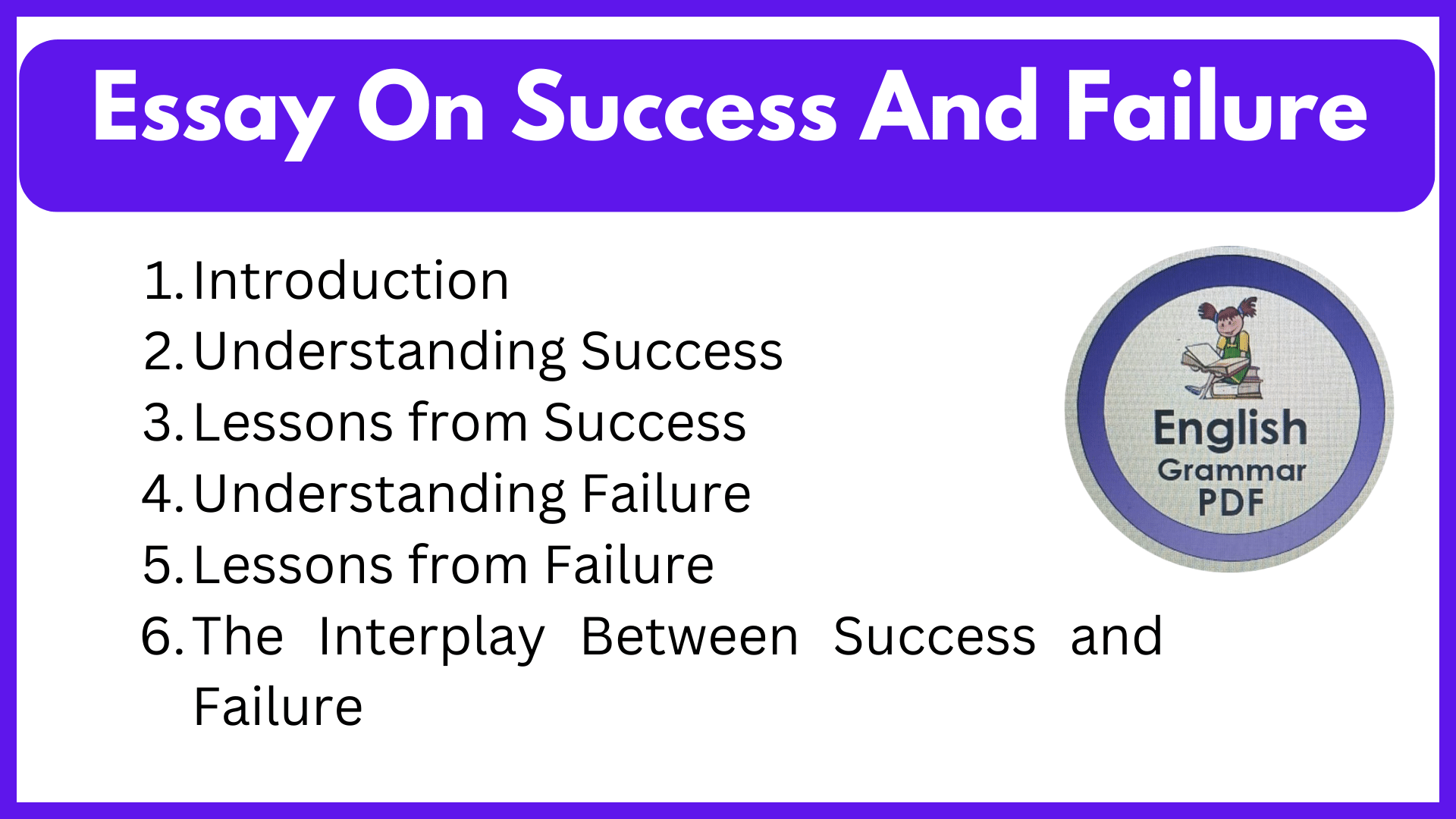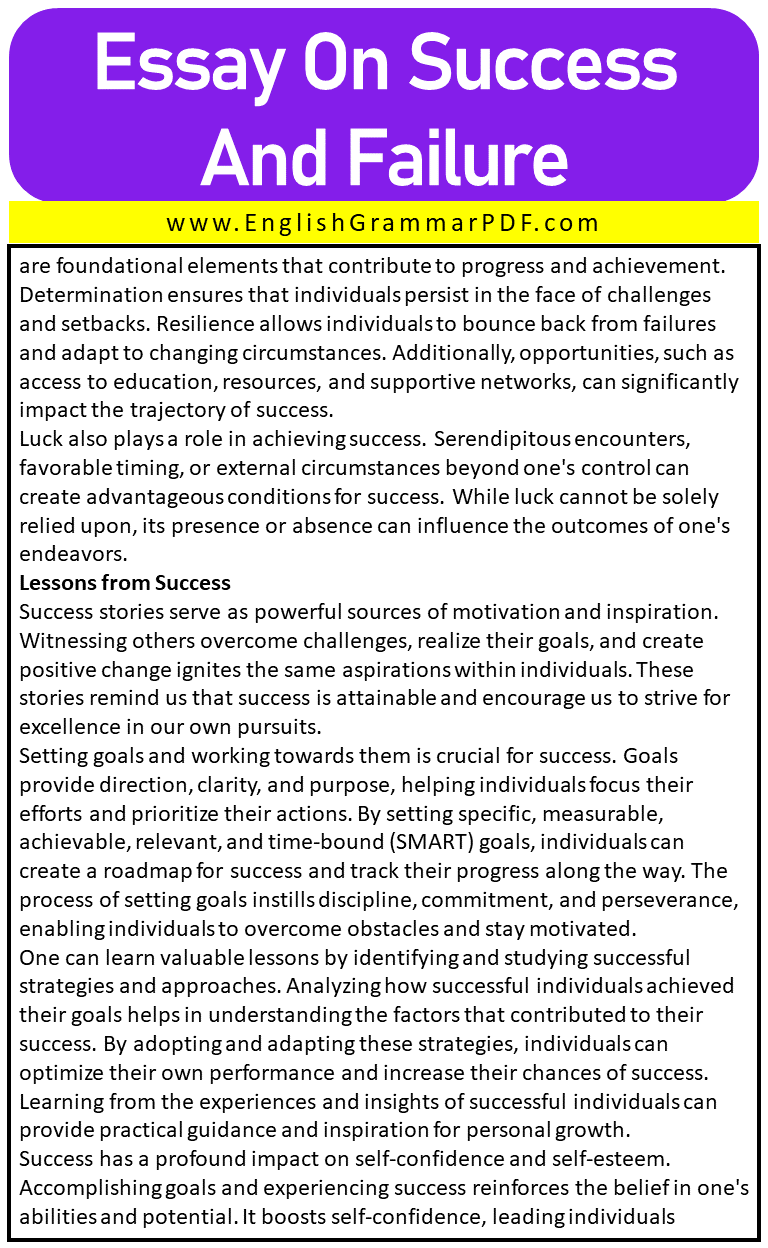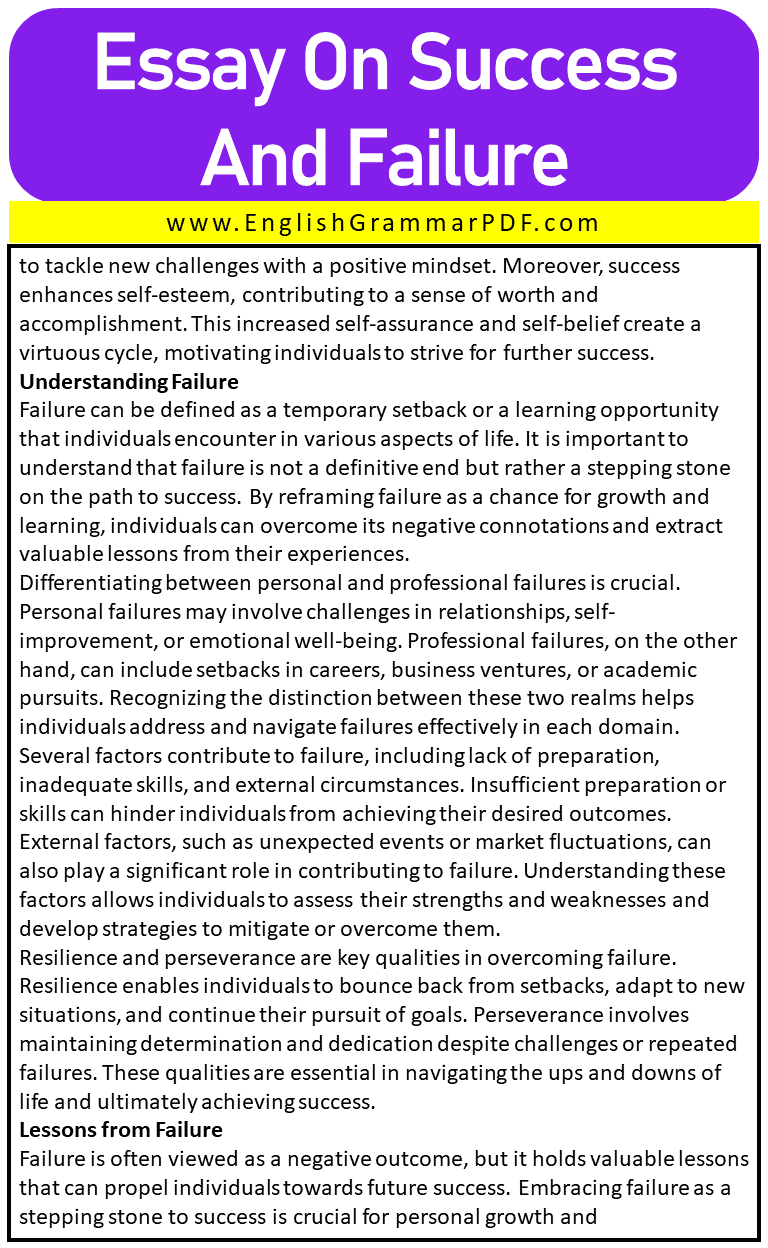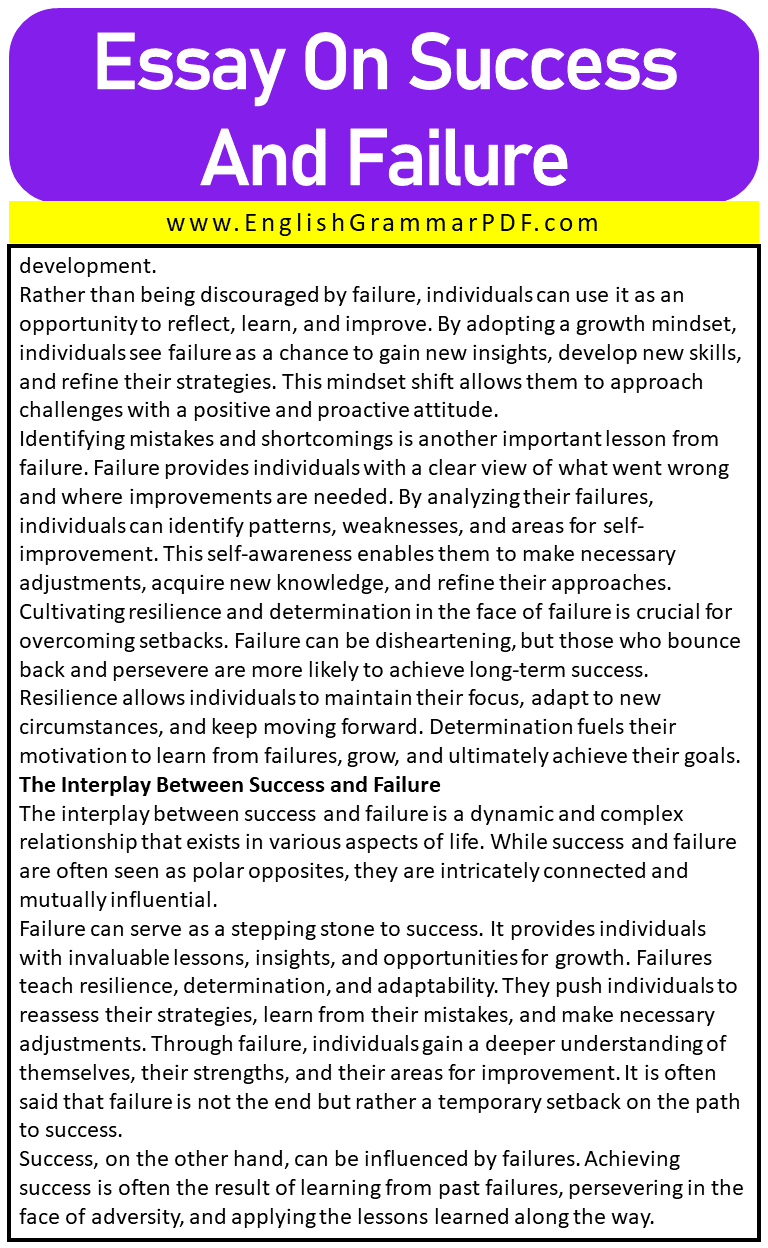Essay On Success And Failure
Outline of Essay:
- Introduction
- Understanding Success
- Lessons from Success
- Understanding Failure
- Lessons from Failure
- The Interplay Between Success and Failure
Introduction
Success and failure are two fundamental aspects of human life that shape individuals and provide valuable lessons. Success can be defined as the achievement of desired goals or outcomes, while failure can be seen as a temporary setback or a learning opportunity. Both success and failure play crucial roles in personal and professional life, influencing individuals’ growth, development, and self-perception. This essay aims to explore the interconnected nature of success and failure, highlighting the lessons they offer and their impact on individuals’ journeys.
Understanding Success
Understanding success requires a comprehensive examination of various factors. Firstly, success can be defined based on individual goals and aspirations. Each person’s definition of success may differ, as it is shaped by their unique values, passions, and ambitions. For some, success may be measured by financial achievements, while for others, it may be about personal fulfillment, meaningful relationships, or making a positive impact in the world.
It is crucial to differentiate between external and internal measures of success. External measures involve societal recognition, material possessions, or professional accomplishments. While these factors can provide a sense of validation and accomplishment, they are not necessarily indicative of true fulfillment. Internal measures of success, on the other hand, focus on personal growth, happiness, and self-actualization. These subjective measures are often more meaningful and satisfying in the long run.
Success is influenced by various factors, including hard work, determination, resilience, and opportunity. Hard work and dedication are foundational elements that contribute to progress and achievement. Determination ensures that individuals persist in the face of challenges and setbacks. Resilience allows individuals to bounce back from failures and adapt to changing circumstances. Additionally, opportunities, such as access to education, resources, and supportive networks, can significantly impact the trajectory of success.
Luck also plays a role in achieving success. Serendipitous encounters, favorable timing, or external circumstances beyond one’s control can create advantageous conditions for success. While luck cannot be solely relied upon, its presence or absence can influence the outcomes of one’s endeavors.
Lessons from Success
Success stories serve as powerful sources of motivation and inspiration. Witnessing others overcome challenges, realize their goals, and create positive change ignites the same aspirations within individuals. These stories remind us that success is attainable and encourage us to strive for excellence in our own pursuits.
Setting goals and working towards them is crucial for success. Goals provide direction, clarity, and purpose, helping individuals focus their efforts and prioritize their actions. By setting specific, measurable, achievable, relevant, and time-bound (SMART) goals, individuals can create a roadmap for success and track their progress along the way. The process of setting goals instills discipline, commitment, and perseverance, enabling individuals to overcome obstacles and stay motivated.
One can learn valuable lessons by identifying and studying successful strategies and approaches. Analyzing how successful individuals achieved their goals helps in understanding the factors that contributed to their success. By adopting and adapting these strategies, individuals can optimize their own performance and increase their chances of success. Learning from the experiences and insights of successful individuals can provide practical guidance and inspiration for personal growth.
Success has a profound impact on self-confidence and self-esteem. Accomplishing goals and experiencing success reinforces the belief in one’s abilities and potential. It boosts self-confidence, leading individuals to tackle new challenges with a positive mindset. Moreover, success enhances self-esteem, contributing to a sense of worth and accomplishment. This increased self-assurance and self-belief create a virtuous cycle, motivating individuals to strive for further success.
Understanding Failure
Failure can be defined as a temporary setback or a learning opportunity that individuals encounter in various aspects of life. It is important to understand that failure is not a definitive end but rather a stepping stone on the path to success. By reframing failure as a chance for growth and learning, individuals can overcome its negative connotations and extract valuable lessons from their experiences.
Differentiating between personal and professional failures is crucial. Personal failures may involve challenges in relationships, self-improvement, or emotional well-being. Professional failures, on the other hand, can include setbacks in careers, business ventures, or academic pursuits. Recognizing the distinction between these two realms helps individuals address and navigate failures effectively in each domain.
Several factors contribute to failure, including lack of preparation, inadequate skills, and external circumstances. Insufficient preparation or skills can hinder individuals from achieving their desired outcomes. External factors, such as unexpected events or market fluctuations, can also play a significant role in contributing to failure. Understanding these factors allows individuals to assess their strengths and weaknesses and develop strategies to mitigate or overcome them.
Resilience and perseverance are key qualities in overcoming failure. Resilience enables individuals to bounce back from setbacks, adapt to new situations, and continue their pursuit of goals. Perseverance involves maintaining determination and dedication despite challenges or repeated failures. These qualities are essential in navigating the ups and downs of life and ultimately achieving success.
Lessons from Failure
Failure is often viewed as a negative outcome, but it holds valuable lessons that can propel individuals towards future success. Embracing failure as a stepping stone to success is crucial for personal growth and development.
Rather than being discouraged by failure, individuals can use it as an opportunity to reflect, learn, and improve. By adopting a growth mindset, individuals see failure as a chance to gain new insights, develop new skills, and refine their strategies. This mindset shift allows them to approach challenges with a positive and proactive attitude.
Identifying mistakes and shortcomings is another important lesson from failure. Failure provides individuals with a clear view of what went wrong and where improvements are needed. By analyzing their failures, individuals can identify patterns, weaknesses, and areas for self-improvement. This self-awareness enables them to make necessary adjustments, acquire new knowledge, and refine their approaches.
Cultivating resilience and determination in the face of failure is crucial for overcoming setbacks. Failure can be disheartening, but those who bounce back and persevere are more likely to achieve long-term success. Resilience allows individuals to maintain their focus, adapt to new circumstances, and keep moving forward. Determination fuels their motivation to learn from failures, grow, and ultimately achieve their goals.
The Interplay Between Success and Failure
The interplay between success and failure is a dynamic and complex relationship that exists in various aspects of life. While success and failure are often seen as polar opposites, they are intricately connected and mutually influential.
Failure can serve as a stepping stone to success. It provides individuals with invaluable lessons, insights, and opportunities for growth. Failures teach resilience, determination, and adaptability. They push individuals to reassess their strategies, learn from their mistakes, and make necessary adjustments. Through failure, individuals gain a deeper understanding of themselves, their strengths, and their areas for improvement. It is often said that failure is not the end but rather a temporary setback on the path to success.
Success, on the other hand, can be influenced by failures. Achieving success is often the result of learning from past failures, persevering in the face of adversity, and applying the lessons learned along the way. Success can provide individuals with a sense of confidence, motivation, and momentum to continue their journey.
However, it is important to note that success does not immunize individuals from failure. Even in the midst of success, failures can occur, reminding individuals to stay humble, adaptable, and open to continuous growth.
Ultimately, the interplay between success and failure highlights the interconnected nature of life’s experiences. Both success and failure are essential components of personal and professional development, shaping individuals, providing valuable lessons, and contributing to their overall growth and achievement.
FAQ’s
How do you manage success and failure?
Managing success and failure involves maintaining a balanced mindset, staying humble in success, and learning from failures to improve. It requires celebrating achievements without becoming complacent and viewing failures as learning opportunities rather than setbacks.
Is failure the key to success?
Failure is not the key to success in itself, but rather the lessons learned from failure can contribute to success. Failure provides valuable insights, resilience, and the motivation to adapt and grow, ultimately increasing the chances of achieving success.
Explore More Essays:
Download the PDF of the Essay:








